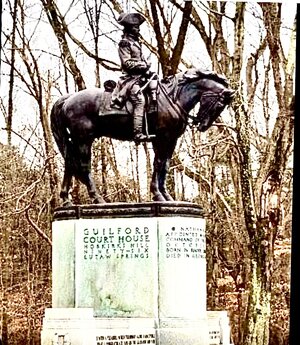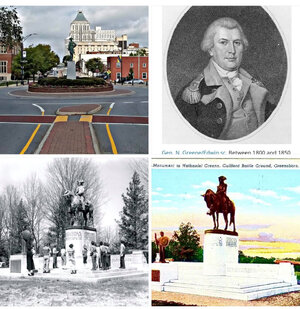donbosco
Legend of ZZL
- Messages
- 6,481

Nathanael Greene is not a Tar Heel. I’d be proud and happy to claim him as a Native Son but he’s a Rhode Islander. He was also a Fighting Quaker, though a full understanding of how his relationship with that denomination changed due to his choosing a soldier’s life eludes me for the most part. In 1773 as ill will over acts of Parliament grew and colonists began to contemplate responses Greene was suspended from his Warwick, R.I. Meeting. In 1774 he participated in the creation of a local militia.
What I do understand is that ne’er will one find a more defined while complex and precisely followed faith than that of The Society of Friends. (That sentence alone indicates my own disquieted lack of understanding of this theology - but at least I know that I do not know.)
Greene is also the namesake of Greensboro. (That third ‘e’ has been lost in several of the places named for him for some reason) Greene was a autodidact militarily, learning by reading, yet generally considered the #2 strategist (after Washington) of The War for Independence. He was an original ‘outside the box’ thinker and the nature of his deployment of eager yet unreliable and untrained civilians in the Southern Campaign made the difference against the overall superior and more experienced British Regular army, especially at the Battles of Cowpens and as every Tar Heel learns, Guilford Courthouse. The crippling blows that Greene-led troops laid on British General Lord Cornwallis sent him reeling north where Washington and French allies could orchestrate the clamp down at Yorktown and the ultimate rebel victory and surrender.
There was a good bit of the Guerrilla in Greene in that he understood that Independence was a fight that required a totality of resistance incorporating the lay of the land, the fruits of the field, and a true measure of local hearts and minds. He kept these things at the forefront of his thinking, literally researching each, as he traversed the Carolinas, crafting his strategy to waylay General Cornwallis in the North Carolina backcountry. He brought a certain Yankee ingenuity to Piedmont Carolina at just the right time.
I remember very well being disappointed upon finding out Greene wasn’t a North Carolinian. Like a lot of folks that have migrated in though he taught us a thing or two and ultimately saved the day. We’d all do well to remember that lesson instead of the often seen and heard rejection of so-called outsiders and their ways and ideas.
As a Quaker at heart Greene was anti-slavery and it appears never purchased an enslaved person. He exited the War for Independence deeply in debt due to the application of his own money to supply his troops. Seeing his poverty, South Carolina and Georgia both bestowed upon Greene plantations albeit in highly contested territories off and on under the control of the British. Part of those parcels included enslaved men, women, and children. At the conclusion of the war, his property mainly exhausted in Rhode Island, Greene moved to his Georgia land. Soon after making his way there, on June 19, 1786 he died, reportedly of sunstroke. He was but 43.
#OTD (August 7) in 1742 Nathanael Greene was born in Potowomut, Rhode Island. Raised a Quaker, he chose to fight for Independence from Great Britain and was named the commander of the crucial Southern Campaign by Washington-his success at The Battle of Guilford Courthouse NC ousted the British army of Lord Cornwallis from region. https://www.loc.gov/item/today-in-history/august-07

